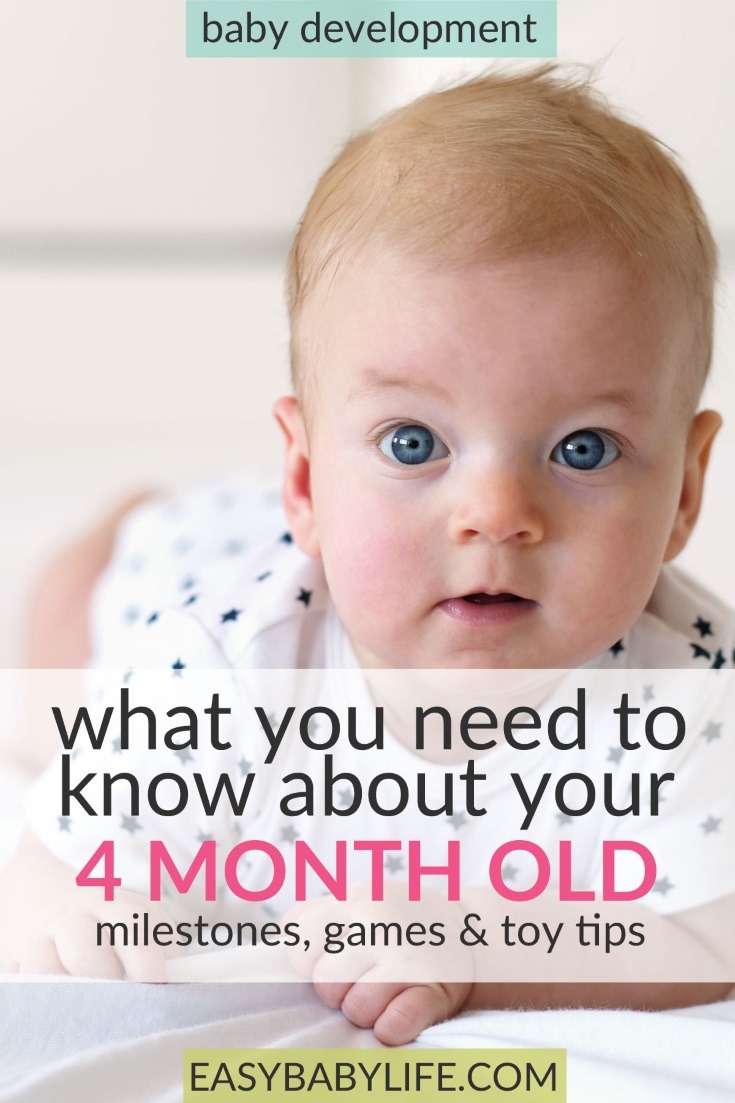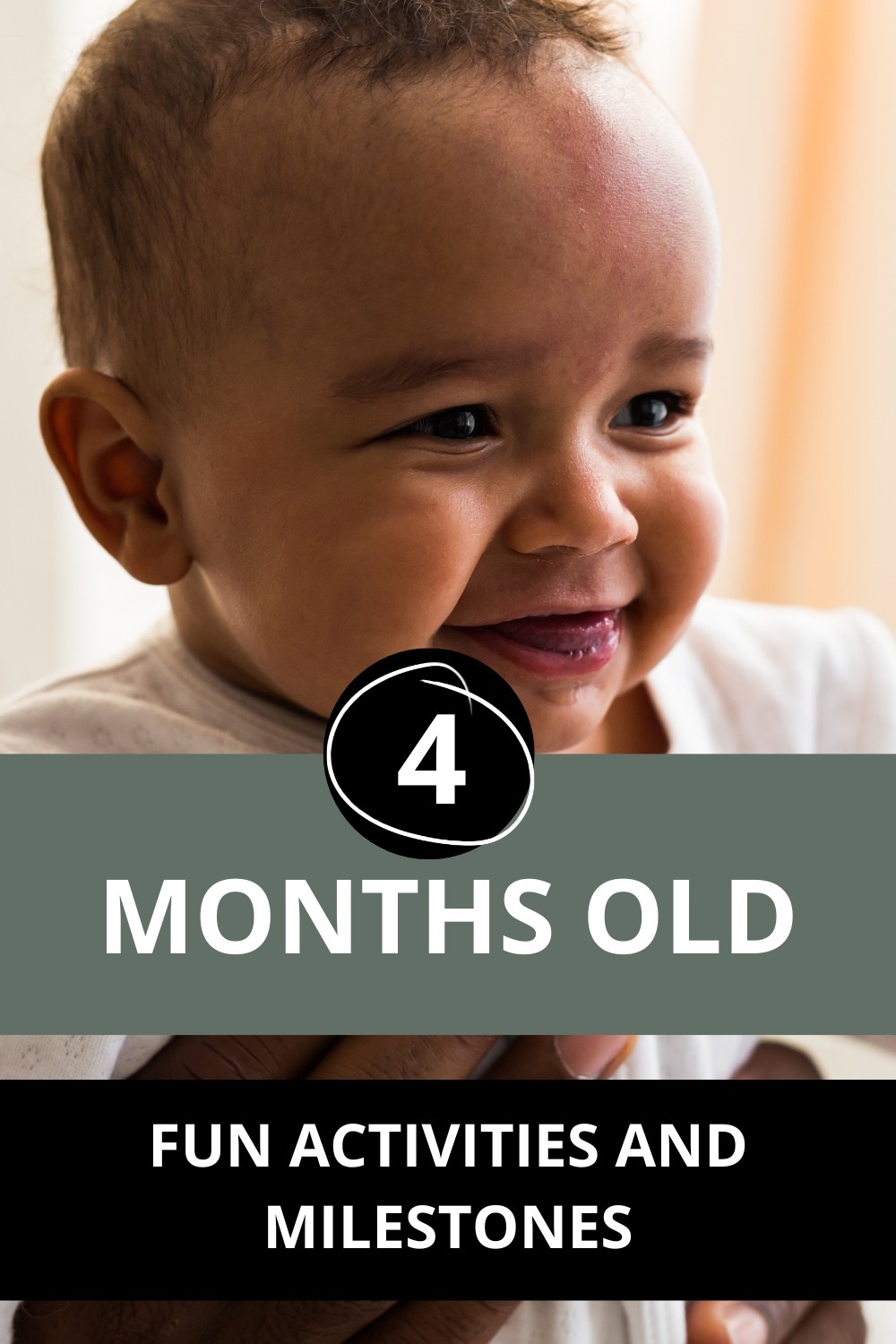A 4-month-old baby loves laughing and playing, even on their own. He is also slowly gaining control over his body. This detailed guide will show what to expect about 4-month-old baby development and provide tips on learning activities and the best toys!
|

Do you have, or soon have, a 4-month-old baby? Love it?
Many 4-month-old babies are quite easy to take care of.
They sleep pretty well, eat less often, cry less, and they can entertain themselves for a little while.
Their stomachs don’t hurt as much anymore, and even babies who have had colic are often better by now.
4-month-old babies are happy kids! Enjoy this phase. More challenging times will come!
All About the 4-Month-Old Baby
- 4 Months Baby Milestones
- Development Concerns at 4-Month-Old
- Games To Play
- Toy Tips
- 4-Month-Old Baby Video
4 Months Baby Milestones
Here are the common developmental milestones for 4-month-old babies.
Physical Development
Weight and Length
Your sweet baby grows bigger and stronger daily.
The average weight of a 4-month-old baby boy is 15 pounds and 7 ounces (7 kg), and 14 pounds and 2 ounces (6.4 kg) for a 4-month-old baby girl.
A 4-month-old baby boy is, on average, 25.25 inches (63.9 cm) long, while the average length for a baby girl of the same age is 24.5 inches (62.1 cm).
Don’t worry if your baby’s weight or length is not average. The most important thing is that your baby’s weight is healthy and that she grows at a healthy rate.
Vision
Your baby’s vision is improving, and his distance vision is better. He will recognize yours and other familiar faces across the room.
By this age, your baby’s vision has also sharpened. Before, your baby preferred sharp contrasting colors, but now, your 4-month-old can recognize more subtle color contrasts.
Motor skills
At this age, most babies have enough strength to balance their heads when sitting on your lap.
The 4-month-old baby is also likely to be able to support himself on his arms when lying on his tummy. Some can even push up so that they lean only on their hands.
However, since most children nowadays sleep on their backs to minimize the risk of SIDS, studies indicate that it now takes longer for the average baby to develop enough strength to push up on elbows and arms. They simply don’t practice as much as before.
Sometime around four months, most babies’ hand-eye coordination has developed enough to the point where the baby really can grab things intentionally. Everything will go into his mouth! At this point, your baby might also shake his rattle or his toys.
Now you must ensure that he can’t get ahold of things that may be harmful to suck on or swallow. With this new ability, your baby might be quite content playing on his own for a while, either in the baby gym or with his own hands or feet.
Yes – some 4-month-old babies are strong enough to lift their feet high enough to be able to play with them, or they’ll chase their feet while sitting up. My youngest didn’t do any of this at four months; he was much more interested in observing his surroundings.
At 4 months, some babies might be able to roll from front to back and sit with support. Don’t worry if your baby still can’t do that. Babies develop at their own timeline. Your baby will do it soon when he is ready.
Cognitive and Social Development
Communication
Language development continues. Some 4-month-old babies will start making different sounds and practicing different vowels and possibly some consonants. My youngest baby said a very clear “mama” at 4.5 months, of course, not knowing what he said.
The babbling and cooing continue, and the baby will try to mimic your language and the sounds she hears when you are talking. Talk to your baby as much as you can. Your baby doesn’t care what you are talking about. She enjoys hearing your voice and learning about communication.
Emotions
Your baby is starting to show more emotions more clearly, and it is easier to tell when she is happy, sad, or frustrated.
At 4 months of age, babies are usually crying less than before, and you can probably recognize your baby’s different cries. Your baby’s cries will differ depending on the need she is trying to communicate (hunger, sleepiness, frustration, etc.).
On the other hand, not only is your baby smiling spontaneously, but at this age, she can also laugh out loud. A wonderful sound!
Sleep
I read everywhere that babies sleep through the night at four months of age. My experience (and that of many mothers I’ve talked to) is that they don’t at all!
Some babies do, but it is also quite common that 4-month-old babies wake up more frequently because they get hungrier. So don’t despair if your baby does not sleep through the night.
Another reason your baby’s sleep might get disrupted around this age, even if she slept through the night up until this point, is a 4-month-old sleep regression.
It is completely normal that babies, just like adults, have periods with better or worse sleep. A sleep regression might be caused by developmental leaps your baby is going through at this stage.
Continue with whatever sleep routines you have, and discuss with your baby’s healthcare provider if it may be the right time to start with some solid food.
Development Concerns (Red Flags) at 4-Month-Old
If you read the above list of 4 months’ baby milestones and get worried because your baby hasn’t yet reached some of those, your first step is to take a de breath and relax! All babies are different and develop at their own pace.
But, of course, it is also important not to shut your eyes if your baby really is showing signs of developmental delays that might need to be addressed.
According to the US Centers for Disease Control and Prevention (CDC), the below are signs that you should talk to your baby’s healthcare provider:
If your 4-month-old baby:
- Doesn’t watch things as they move
- Doesn’t smile at people
- Can’t hold the head steady
- Doesn’t coo or make sounds
- Doesn’t bring things to mouth
- Doesn’t push down with legs when feet are placed on a hard surface
- Has trouble moving one or both eyes in all directions
In such a case, act early so your baby can be assessed and get help if needed.
You can watch this video, which clearly shows motor delays for 4-month-old babies.
Games To Play
 Talk to your baby!
Talk to your baby!
At around 4 months, you might notice that your baby likes to meet other people. Being at home all day long can actually become a bit boring.
Baby swim classes or baby singing, or some other baby-friendly activity can be a fun way to stimulate baby development now.
By coincidence, I also discovered that my 4-month-old baby was extremely interested in picture books. He got completely excited when he saw the bright-colored pictures I was showing our toddler.
So reading books can be added to the list.
Going from lying to standing with your help (pulling her arms carefully) is great fun, as well as flying (you lift her high up into the air).
If not earlier, your baby has probably become ticklish by now (newborn babies are not). So tickling can be great fun. Many babies are very ticklish around their necks and thighs.
You can encourage your baby to roll over from the back to the stomach by holding up toys for him to reach for.
You two can also play peekaboo. Cover your face with your palms with a blanket or a pillow. Your baby will love seeing your face reappear. This game is also great for teaching your baby about object permanence.
Best Toys for 4-Month-Old Babies
With the new ability to put everything into his mouth, your baby will enjoy all sorts of rattles like this one. (Link to Amazon.)
Make sure they have some little part – tail, nose, or something, that can be sucked on. After a while, my children would get furious when trying to put a too-big toy into their mouths.
And whatever you do, don’t cut off the little piece of cloth with washing instructions (unless, of course, it might fall off). Chances are your baby will love these little pieces of cloth even more than the actual toy!
4-Month-Old Baby on Video
In this video with 4-month-old babies, you can see some gorgeous babies reaching for things and trying to taste them, actually enjoying some tummy time and having fun playing with their moms. Typical 4-month-olds!
Where would you like to go next?
You can check out all posts about 4-month-olds here or read about other baby months:
|
What is YOUR 4-month-old baby like? I’d love to hear! Leave a comment below! <3

Paula Dennholt founded Easy Baby Life in 2006 and has been a passionate parenting and pregnancy writer since then. Her parenting approach and writing are based on studies in cognitive-behavioral models and therapy for children and her experience as a mother and stepmother. Life as a parent has convinced her of how crucial it is to put relationships before rules. She strongly believes in positive parenting and a science-based approach.
Paula cooperates with a team of pediatricians who assist in reviewing and writing articles.







